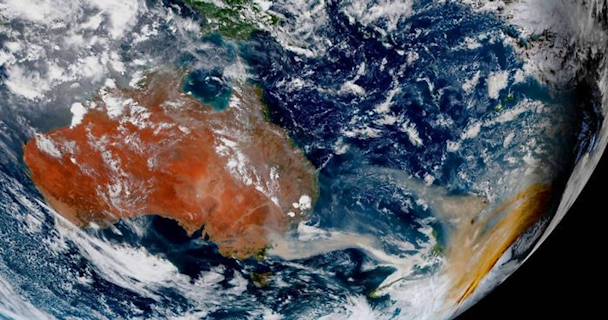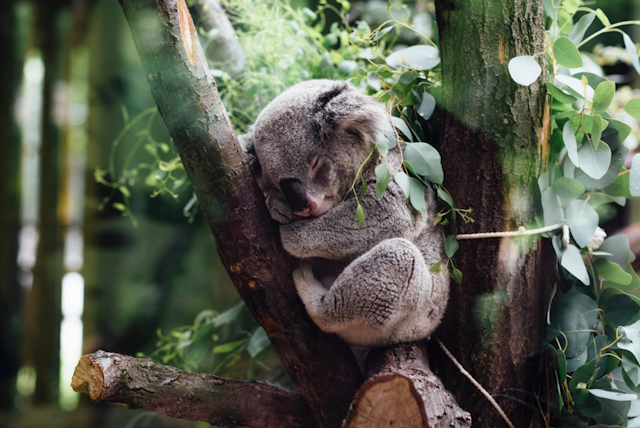Social media as a force for good: the case of Australian bushfires
Our planet is in the middle of a climate crisis, the likes of which have never been seen before. But traditional news media can only devote so much time to the issue.

Australia as seen from Earth's orbit. / NASA EOSDIS
In times like these, social media comes to the rescue and helps the news break through the noise. Today we’re going to talk about the Australian bushfires, still ravaging the continent, and the social media response that, perhaps, kept them from becoming even more tragic.
The situation
It’s summer in the Southern Hemisphere, which, for drier areas, means an increased risk of fires. And you can’t get much drier than the Australian bush. For Australia, 2019 has been the hottest year on record. Just this past December, the country encountered its hottest day in history - with a mind-boggling 41.9°C average maximum. If you also consider the fact that 2019 was the driest year in Australian history — with an average national rainfall of just 277mm - it’s easy to see why the fires have been as deadly as they were.

By the beginning of 2020, six million hectares of Australian soil had been burned, and, during the first week of the year, the total size of the area affected by fire grew to an unprecedented ten million hectares. Smoke from the fires travelled as far as New Zealand, the island nation located 2000 km east of Australia, and is expected to circle the globe.
The catastrophe of such enormity has insane implications for the country’s wildlife, its indigenous peoples, who have suffered more than enough, and its economy. Thankfully, people around the world did not remain indifferent. They used social media to spread awareness of the issue, raise money for the firefighting efforts, and mobilize volunteers.
The reaction
Awareness was spread through viral photos and videos. This image of a kangaroo and a burning house, captured by photographer Matt Abbott, brought a lot of attention to the issue. Despite being commissioned by the New York Times, most people encountered it ‘in the wild’ - on social media. Pictures and videos of yellow skies over New Zealand, likewise, went viral without a lot of ‘signal boosting’ from major publications. Local groups’ efforts to rescue animals have also resulted in a number of viral videos, cute and terrifying at the same time.
The shock these visuals inspire speaks louder than any journalist can, so regular people, as well as celebrities, starting fundraising efforts as soon as they got a chance to. The Facebook campaign of the Australian comedian Celeste Barber raised more than 50 million dollars for the country’s firefighters. Over the course of two weeks, more than a million people donated, swiftly exceeding the $30,000 original target. The tennis world also has their eyes on Australia as it hosts the first Grand Slam of the season. Nick Kyrgios, one of the country’s foremost tennis players, took to Twitter in order to propose a fundraising effort. His voice was heard — loud and clear. Tennis stars such as Roger Federer and Serena Williams pledged to contribute to this campaign, and a total of $5 million was raised in a single day.

Brands donated millions of items to help those most affected by the fires. Unilever Australia provided food, personal hygiene items, and other essentials to foodbanks across the country. What’s more, it offered paid leave to all the volunteering employees. Small business owners also do their best to raise money for the struggling nation. Sarah McClelland makes a living by selling science kits for children on a website called Little Bins for Little Hands. She introduced an Australia-themed item to her online store, and will donate all of the proceeds from its sales to a non-profit that helps Australian animals. When interviewed, she explained that in this day and age, you no longer have to be a celebrity to make a difference. This would probably not be the case without the spread of social media.
Small local groups used social media to organize their volunteering efforts. Members of the Jewish community united to provide housing and financial aid for the families that lost their homes, and delivered fresh-cooked meals to the country’s firefighters. The Australian Islamic Centre delivered five truck-loads of supplies to the affected areas, and cooked breakfast for the volunteers. Even the poker community left their mark. A big casino chain, known to host poker tournaments, donated $5 million for bushfire relief. Meanwhile, regular poker enthusiasts got together to raise more than $50,000 for charity - not an insignificant sum of money for such a niche hobby group.
Takeaways
Everyone on social media is an influencer, no matter how many followers you have. The right words uttered at the right time can break through the glass ceiling of your immediate reach, and be heard by a worldwide audience. This is changing the ways people come together in times of crisis. The voices of those who suffer are amplified far beyond what would’ve been possible just 10 years ago. And those who want to help can do it easier than ever.

Social media platforms weren’t made with charity and organizing in mind, and yet, with each year, these fundraisers are propelled to new heights. That is why we integrated charity donations into our grassroots marketing app - on day one. Every one of our micro- and nano-influencers has the freedom to seamlessly help the cause they believe in. And brands can help make it happen.
The events of the past two weeks have also given us something to worry about. Alongside genuine information, Twitter circulated a bunch of unsubstantiated claims, attributing the escalation of the crisis to politically motivated arsonists. The disinformation efforts were meant to divert international attention from the problem at hand, and push a specific political agenda. If you, like us, believe that #ThereIsNoPlanetB, you have to stay vocal.
Misha Sokolov is the co-founder of MNFST
Content by The Drum Network member:

MNFST
MNFST is a digital profile company. We are on a mission to inspire creativity and democratize influencer market in the same way Airbnb and Uber democratized property...
Find out more
